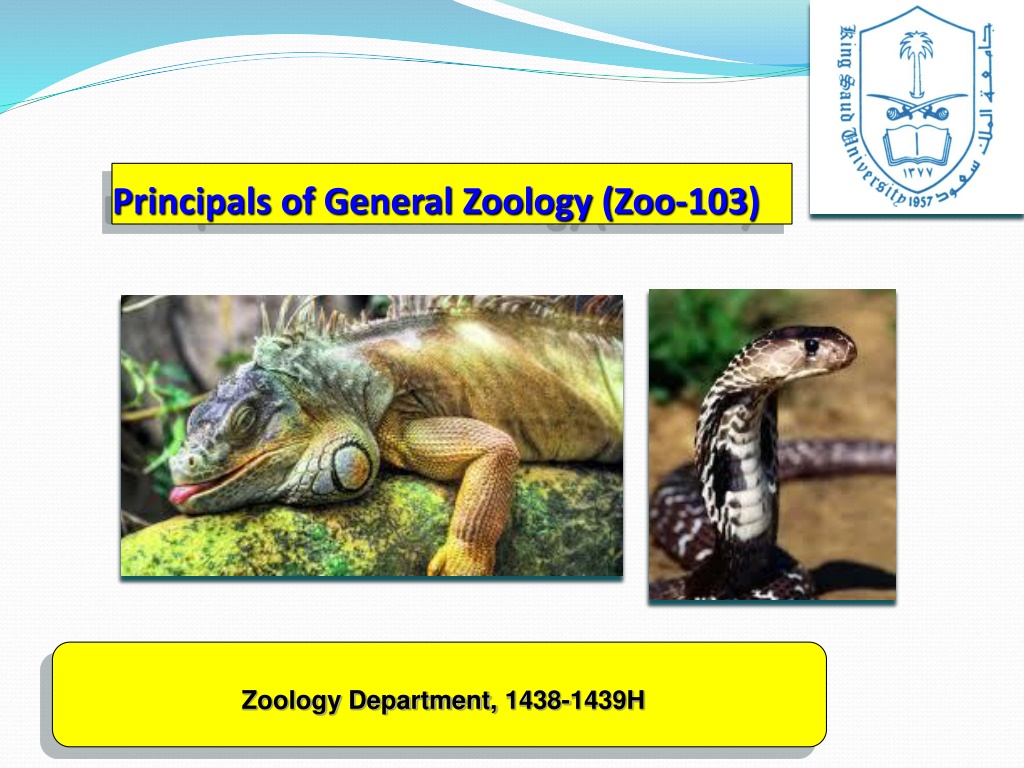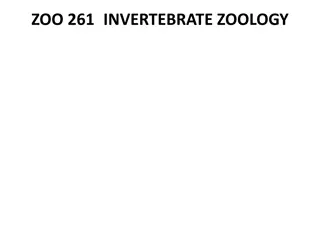Overview of Zoology: Principals, Objectives, Assessment, and Tips for Success
Delve into the fascinating world of Zoology with a detailed exploration of animal cell structure, tissue types, taxonomy, anatomy, physiology, and more. Learn about assessments, grading criteria, and tips for excelling in lectures. Understand the significance of biology in studying life, including the fields of zoology, anatomy, physiology, evolution, and ecology.
Download Presentation

Please find below an Image/Link to download the presentation.
The content on the website is provided AS IS for your information and personal use only. It may not be sold, licensed, or shared on other websites without obtaining consent from the author. Download presentation by click this link. If you encounter any issues during the download, it is possible that the publisher has removed the file from their server.
E N D
Presentation Transcript
Principals of General Zoology (Zoo-103) Zoology Department, 1438-1439H
Learning Objectives Structure, function and cytogenetics of the animal cell Different animal tissues Taxonomy Important Phyla, Classes, Genera, and Species Anatomy and physiology Interesting structures Nutrition, digestion and metabolism Blood composition and function
Assessment Lecture 2 Midterm exams (30%) Cumulative final exam (40%) 70% of total grade Laboratory 2 laboratory exams Lab notebook Field trip or paper 30% of total grade
Tips for Succeeding in Lecture Read assigned chapters before attending lecture (do the same for lab) Study at least 4 hrs per week, from notes See me with specific questions Tests are combination of multiple-choice and short answer / fill-in questions Test questions will be derived from both the lecture notes
Grading and Will There Be a Curve? Standard A = 90% or above B = 80% - 89% C = 70% - 79% Etc. Plus / Minus A+ = 95% or above A = 90% - 94% B+ = 85% - 89% Etc.
Missed / Late Exam Policy No make-up exams, except with: Medical documentation Legal documentation Make-up exams will be essay form If you arrive late to an exam, and even one exam has already been turned in, you will be given an essay test
The Biological Sciences Biology study of life Many different fields (some examples) Zoology study of animals Anatomy studies the structure of the body. Physiology study of how body structures (cells, organs, organ systems, etc) function Evolution study of change over time (molecular level to ecosystem level) Ecology study of how organisms interact and affect their environments, or vice versa
Zoology (Science of animal) File:Animal diversity October 2007.jpg Is the branch of Biologythat focuses on the structure, function, behavior , and evolution of animals
Subfields of zoology Zoography , also known as descriptive zoology: describes animals and their habitats Comparative anatomy: studies the structure of animals . Animal physiology : is the study of the mechanical, physical, and biochemical functions ofanimals . Molecular Biology : studies the common genetic and developmental mechanisms of animals and plants.
Subfields of zoology Behavioral Ecology: The study of the ecological and evolutionary basis for animal behaviour, and the roles of behaviour in enabling an animal to adapt to its environment (both intrinsic factors and extrinsic factors). Evolutionary Biology : Studies the evolutionary processes that produced the diversity of life on Earth, See of both animals and plants is considered in the articles on evolution, population genetics, heredity, variation, Mendelism, reproduction. Systematics (phylogenetics): The study of the evolutionary development of organisms and relationships between them through time. Taxonomy: classify organisms into the appropriate taxonomic groups
Subfields of zoology Entomology: is the study of insects, the largest group of animals. Palaeontology: is the study of prehistoric life, including organisms' evolution and interactions with each other and their environments. As a "historical science Ethology: is the study of animal behavior

















































